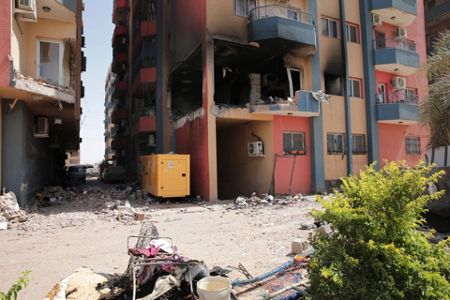WASHINGTON (AP) — The Pentagon is moving additional troops and equipment to a Naval base in the tiny Gulf of Aden nation of Djibouti to prepare for the possible evacuation of U.S. Embassy personnel from Sudan.
Two Biden administration officials say the deployments to Camp Lemonnier in Djibouti are necessary because of the current uncertain situation in Sudan, where fighting is raging between two warring factions.
The officials spoke on condition of anonymity to describe the administration’s planning for a potential evacuation. That planning got underway in earnest on Monday after a U.S. Embassy convoy was attacked in Khartoum, the Sudanese capital.
In a statement Thursday, the Pentagon said it will deploy “additional capabilities” to the region to potentially help facilitate an evacuation of embassy personnel from Sudan if required, but provided no details, and did not state the location.
National Security Council spokesman John Kirby said the decision to prepare for a possible evacuation was made by President Joe Biden in the “last couple of days.” The president “authorized the military to move forward with pre-positioning forces and to develop options," Kirby told reporters at the White House.
“There’s no indication that either side is deliberately going after or trying to hurt or target Americans,” Kirby said. “But it’s obviously a dangerous situation.”
Deputy State Department spokesman Vedant Patel said conditions were not yet safe to mount any evacuation but stressed that all embassy personnel are safe and accounted for and that those who haven’t been moved to a secure centralized location had been instructed to shelter in place at their homes.
U.S. officials have told lawmakers concerned about the situation that there are roughly 70 American staffers at the Khartoum embassy, according to congressional aides.
An estimated 16,000 private U.S. citizens are registered with the embassy as being in Sudan, but the State Department has cautioned that that figure is likely inaccurate as there is no requirement for Americans to register nor is there a requirement to notify the embassy when they leave.
Since hostilities between the two factions erupted last weekend, the U.S. has been contemplating the evacuation of government employees and has been transporting them from their homes to a secure, centralized location to prepare for such an eventuality.
The officials said Djibouti, a small country on the Gulf of Aden sandwiched between Ethiopia, Eritrea and Somalia, will be the staging point for any evacuation operation.
However, any evacuation in the current circumstances is fraught with difficulty and security risks as Khartoum’s airport remains non-functional and overland routes from the capital out of the country are long and hazardous even without the current hostilities.
If a secure landing zone in or near Khartoum cannot be found, one option would be to drive evacuees to Port Sudan on the Red Sea. But that is a 12-hour trip and the roads over the 523-mile (841-kilometer) route are treacherous.
Another might be to drive to neighboring Eritrea, however that would also be problematic given that Eritrea’s leader, Isaias Afwerki, is not a friend of the U.S. or the West in general.
The last time the U.S. evacuated embassy personnel overland was from Libya in July 2014, when a large convoy of U.S. military vehicles drove staff from the Tripoli embassy to Tunisia. There have been more recent evacuations, most notably in Afghanistan and Yemen, but those have been conducted largely by air.
Copyright 2023 The Associated Press. All rights reserved. This material may not be published, broadcast, rewritten or redistributed without permission.





